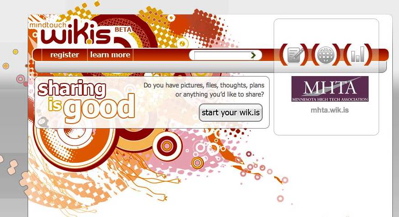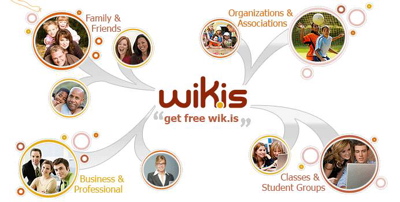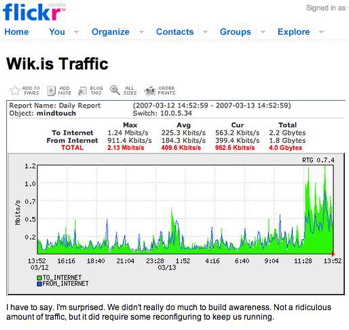First, I hear that MindTouch, which was presenting at the Community 2.0 conference this week in Vegas (which I’m bummed I couldn’t attend), announced the re-launch of its free.pngki site under the new name (and actual Internet domain) “Wik.is”. You can read the press release here.  The company’s wiki-hosting site was previously located at Wiki.com, but, due to a licensing issue with the domain name operator, MindTouch had to scramble to get its customers’ wikis migrated rather quickly over to a new domain. [More on that later.] I had the opportunity to catch up with Aaron Fulkerson, VP of Product at San Diego-based MindTouch, to do this brief Q&A:
The company’s wiki-hosting site was previously located at Wiki.com, but, due to a licensing issue with the domain name operator, MindTouch had to scramble to get its customers’ wikis migrated rather quickly over to a new domain. [More on that later.] I had the opportunity to catch up with Aaron Fulkerson, VP of Product at San Diego-based MindTouch, to do this brief Q&A:
Tech~Surf~Blog: What’s the new site for? And who is it for?
Fulkerson: MindTouch Wik.is gives an organization or individual the ability to integrate a fun and easy-to-use community tool into their existing web site. We offer a free, ad-driven version but, for only $60 a year, users can have an ad-free community wiki that has a consistent look, feel, and navigation with their existing online properties. It’s been my experience that, by giving users a consistent look-and-feel, they’re more inclined to use the technology and participate in the community. The benefits to users of Wik.is include additional and fresh content, community growth, and much more. 
Tech~Surf~Blog: Why does MindTouch sponsor this site? What’s in it for you?
Fulkerson: Well, for starters, $60 a year for every organization that upgrades to the Pro version! Seriously, though, we priced the Pro version in order to make the most basic functionality accessible to any organization. We believe that every web site should have a community wiki embedded into it. Wikis are such a powerful and easy-to-use tool that every organization’s web site should have one. At only $60 a year, that’s now a reality.
And, if a user opts for just the free version, we’re still building awareness about MindTouch and our other products. Whether you’re a non-profit or an individual interested in a simple and fun community site, a small business or a large enterprise looking for a community-driven Intranet, or a major media or publishing company seeking a user-generated content strategy, MindTouch has a product that will provide proven benefits. MindTouch is the most comprehensive vendor of wikis, and we’re proving it again.
Tech~Surf~Blog: Explain the “re” launch of this site — what was it before? What will it have from the original site? How is it similar or different?
Fulkerson: Wiki.com was a site that previously licensed our software. MindTouch severed relations with the operator of this site in early November 2006, but, in order to not hurt the end-users of Wiki.com, we allowed Wiki.com to continue to use our software for communities that were already created. Later, in January of this year, when a community member of Wiki.com informed us the operator planned to pull the plug on Wiki.com in 72 hours, we offered to migrate all the content to our servers. We were very concerned that people were about to lose their community and content. It turns out the operator of the site, too, was clearly concerned about this and approved the migration. We worked very hard, almost around the clock, over 48 hours to migrate the sites.
Tech~Surf~Blog: Who is now running Wiki.com (which just also relaunched), and does MindTouch have anything to with it anymore?
Fulkerson: I don’t know the details. We have no involvement with this.
Tech~Surf~Blog: On a side note, how are you and the others who relocated from St. Paul to your San Diego office enjoying your new home?
Fulkerson: I can’t speak for everyone, but my wife and 14-month-old daughter really like Little Italy, as do I — that’s the district where we reside in downtown San Diego. In fact, I love it! It’s a three-block walk to the new office, and I can walk the whole way with a wi-fi connection! There’s a real sense of belonging in the community.
Tech~Surf~Blog: Will you be visiting the Twin Cities again soon?
Fulkerson: I’m really excited to be presenting on a panel at the upcoming Minnesota High Tech Association Spring Conference, on Tuesday, April 10, 2007. I’m looking forward to being back in Minnesota and connecting with friends. [Note: Yours truly is moderating the panel.]
Tech~Surf~Blog: What’s the reaction been to your new Wik.is site so far?
Fulkerson: Traffic has been stellar. [The chart here I grabbed from Aaron’s Flickr page.] We had almost 400 sites register just on March 13! I was suprised.  I really believe the Pro version is exactly what every organization and web site needs in features, and because you can give it a consistent look, feel, and nav. I think about all the organizations I’ve been involved with in the past and know this would be a big help.
I really believe the Pro version is exactly what every organization and web site needs in features, and because you can give it a consistent look, feel, and nav. I think about all the organizations I’ve been involved with in the past and know this would be a big help.
[End of Q&A.]
Anyway, back to “Wiki Week.” On the same day as MindTouch makes its announcement, TechCrunch comes forth with a story about another fairly significant development in the wonderful world of wikis: WikiSeek Launches Community Edited Search Engine. WikiSeek is no upstart — it’s two years old and funded to the tune of $5 million by Sequoia Capital.
Just a few days prior, as if to pre-empt the above, the much-hyped new venture of Wikipedia founder Jimmy Wales planted another media story: Wikia plans editable Web search engine.
Then, as if this wasn’t enough to make this week extremely wiki-ish, Business Week up and publishes a CEO Guide to Wikis, with several feature articles on the topic — more than you thought you ever wanted to know about wikis. It’s as if someone declared this National Wiki Week!
Meantime, just today, Jimmy Wales’ new Wikia.com venture took a pretty good bashing from one commenter. Search Insider’s Gord Hotchkiss didn’t hold back on his skeptical view of the whole thing in this Mediapost piece: Jimbo Wales And People-Powered Search: A Long Shot.
We all know the human being can only scale so far, but how far can a collective of them scale? I guess that’s the question when it comes to wiki-based search. Can people really ever be expected to do as well or better for search as algorithms can, at least with any speed? And can they be free of politics, as algorithms surely would expect to remain? 🙂 What do you think, is this Jimbo guy smoking something exotic with that “other peoples’ money” he scored for this new deal?
 advantage of that service and created a swicki for my own blog, which I set up and took live in about 15 minutes. You can see it at the right, complete with what’s called the “buzz cloud” within the widget itself.] In its announcement, Eurekster said publishers are invited to create their own swickis, free of charge, with the Eurekster SwickiBuilder
advantage of that service and created a swicki for my own blog, which I set up and took live in about 15 minutes. You can see it at the right, complete with what’s called the “buzz cloud” within the widget itself.] In its announcement, Eurekster said publishers are invited to create their own swickis, free of charge, with the Eurekster SwickiBuilder 
Recent Comments